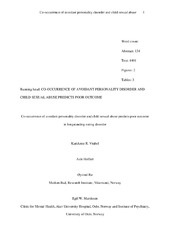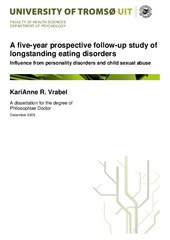| dc.contributor.advisor | Hoffart, Asle | |
| dc.contributor.author | Vrabel, KariAnne R. | |
| dc.date.accessioned | 2010-10-04T11:26:47Z | |
| dc.date.available | 2010-10-04T11:26:47Z | |
| dc.date.issued | 2010-05-05 | |
| dc.description.abstract | Follow-up studies have shown that 20-30% of patients with eating disorders develop longstanding symptoms seriously impairing their daily life. There are very few studies on the course of these patients.
<br>This dissertation consists of three papers on patients admitted to a specialized inpatient treatment program at the Modum Bad psychiatric hospital. The participants were assessed upon admission, discharge and at one-, two-, and five-year follow-up.
<br>Paper I reports on the course and outcome at five years after completing treatment and identifies subgroups of patients with different course and outcome. The key findings were first that among the 77 patients (90%) who participated, 46 patients (61%) had improved, and 30 (39%) did not meet diagnostic criteria for an eating disorder. Second, a cluster analysis identified a group of 21 patients (27%) with no improvement over time.
<br>Paper II reports on the change in proportions of personality disorders over time. The results showed that during inpatient treatment, 58 patients (78%) had one or more personality disorders and this was reduced to 32 patients (43%) at the five-year follow-up. Dimensional indices and a mean personality index changed significantly over time in anorexia nervosa, bulimia nervosa and eating disorder not otherwise specified, but no significant changes between diagnoses emerged. Recovered patients had lower frequency of personality disorder (p < .01).
<br>Paper III reports on prognostic factors for the poor outcome of eating disorder symptoms and how the predictors interact. Multi-level mixed model was used to examine the predictors. In these prospective longitudinal analyses, avoidant personality disorder and child sexual abuse interacted in predicting high levels of eating disorder during a long-term course.
<br>In sum, this dissertation addressed several important topics in the eating disorder field. The main findings are:
<br>There was statistically significant reduction in eating disorder symptoms at the five-year follow-up.
<br>Cluster analysis identified a group of patients with no improvement over time.
<br>Patients had higher probability of recovery from personality disorders than from eating disorders.
<br>Avoidant personality disorder and child sexual abuse interacted in predicting high levels of eating disorder symptoms during the long-term course. | en |
| dc.description.doctoraltype | ph.d. | en |
| dc.description | Papers number 1 and 2 of the thesis are not available in Munin due to publisher's restrictions:
<br>1. Vrabel, K. R., Ro, O., Martinsen, E. W., Hoffart, A., & Rosenvinge, J. H.: «The course of illness following inpatient treatment of adults with longstanding eating disorders: A 5-year follow-up», International Journal of Eating Disorders, 41(2008), 224-232 (Wiley). Available at <a href=http://dx.doi.org/10.1002/eat.20485>http://dx.doi.org/10.1002/eat.20485</a>
<br>2. Vrabel, K. R., Ro, O., Martinsen, E. W., Hoffart, A., & Rosenvinge, J. H.: «Five-year prospective study of personality disorders in adults with longstanding eating disorders», International Journal of Eating Disorders, 43(2009), 22-28 (Wiley). Available at <a href=http://dx.doi.org/10.1002/eat.20662>http://dx.doi.org/10.1002/eat.20662</a> | en |
| dc.format.extent | 819221 bytes | |
| dc.format.mimetype | application/pdf | |
| dc.identifier.isbn | 978-82-7589-261-2 | |
| dc.identifier.uri | https://hdl.handle.net/10037/2699 | |
| dc.identifier.urn | URN:NBN:no-uit_munin_2442 | |
| dc.language.iso | eng | en |
| dc.publisher | Universitetet i Tromsø | en |
| dc.publisher | University of Tromsø | en |
| dc.rights.accessRights | openAccess | |
| dc.rights.holder | Copyright 2010 The Author(s) | |
| dc.rights.uri | https://creativecommons.org/licenses/by-nc-sa/3.0 | en_US |
| dc.rights | Attribution-NonCommercial-ShareAlike 3.0 Unported (CC BY-NC-SA 3.0) | en_US |
| dc.subject | VDP::Samfunnsvitenskap: 200::Psykologi: 260::Klinisk psykologi: 262 | en |
| dc.subject | VDP::Social science: 200::Psychology: 260::Clinical psychology: 262 | en |
| dc.subject | VDP::Samfunnsvitenskap: 200::Psykologi: 260::Personlighetspsykologi: 264 | en |
| dc.subject | VDP::Social science: 200::Psychology: 260::Personality psychology: 264 | en |
| dc.subject | VDP::Medisinske fag: 700::Klinisk medisinske fag: 750::Psykiatri, barnepsykiatri: 757 | en |
| dc.subject | VDP::Medical disciplines: 700::Clinical medical disciplines: 750::Psychiatry, child psychiatry: 757 | en |
| dc.subject | VDP::Medisinske fag: 700::Helsefag: 800::Medisinsk/odontologisk etikk, atferdsfag, historie: 805 | en |
| dc.subject | VDP::Medical disciplines: 700::Health sciences: 800::Medical/dental ethics, behavioural sciences, history: 805 | en |
| dc.subject | eating disorder | en |
| dc.subject | personality disorder | en |
| dc.subject | post-traumatic stress disorder | en |
| dc.subject | longitudinal | en |
| dc.subject | prospective | en |
| dc.title | A five-year prospective follow-up of longstanding eating disorders : influence from personality disorders and child sexual abuse | en |
| dc.type | Doctoral thesis | en |
| dc.type | Doktorgradsavhandling | en |


 English
English norsk
norsk




